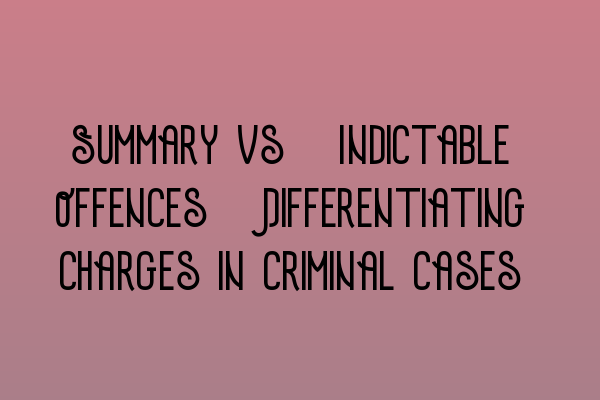Summary vs. Indictable Offences: Differentiating Charges in Criminal Cases
In the realm of criminal law, understanding the difference between summary and indictable offences is crucial. Whether you’re a solicitor, law student, or simply curious about the intricacies of the legal system, this article aims to provide a comprehensive guide to differentiating charges in criminal cases. By the end of this post, you’ll have a solid understanding of summary and indictable offences and the implications they carry.
What are Summary Offences?
Summary offences, sometimes referred to as minor offences, are generally less severe in nature compared to indictable offences. These offences are often dealt with in the lower courts, such as Magistrates’ Courts, where a single judge presides over the case. Some common examples of summary offences include petty theft, public intoxication, or disorderly conduct.
One notable characteristic of summary offences is that they do not usually carry the possibility of a jury trial. Instead, the judge alone determines the verdict and any subsequent penalties. This streamlined process allows for a quicker resolution and alleviates the burden on the courts.
However, despite being categorized as minor offences, summary offences can still have significant consequences for the accused individuals. Convictions for summary offences may result in fines, community service, probation, or even short-term imprisonment. It is essential to approach these cases with the same level of diligence and professionalism as any other criminal matter.
Understanding Indictable Offences
On the other end of the spectrum, indictable offences are more serious in nature and have the potential for harsher penalties. These offences are typically heard in higher courts, including the Crown Court, which consists of a jury and a judge. Examples of indictable offences include murder, rape, and robbery.
Unlike summary offences, indictable offences allow the accused individual to have their case presented before a jury. The jury’s role is to determine the defendant’s guilt or innocence based on the evidence presented during the trial. The judge then determines the appropriate sentence, if necessary.
Indictable offences often involve complex legal procedures and require robust advocacy skills. It is important for solicitors and legal professionals to thoroughly prepare their cases, gather strong evidence, and present persuasive arguments to ensure a fair trial and the protection of their client’s rights.
The Hybrid Offence: Falling in Between
While summary and indictable offences represent the two ends of the spectrum, it’s worth mentioning hybrid offences that fall in between. These offences can be prosecuted either summarily or on indictment, depending on the circumstances and severity of the case.
The decision to proceed with a hybrid offence as a summary or indictable offence lies with the prosecution. Factors such as the defendant’s criminal history, the nature and seriousness of the offence, and any aggravating or mitigating factors play a role in this determination. Common examples of hybrid offences include drug possession, assault causing bodily harm, and theft over a certain value.
Seeking Legal Expertise
Whether you’re facing a summary, indictable, or hybrid offence, seeking legal expertise is crucial to ensure your rights are protected and to attain the best possible outcome. At SQE Criminal Law & Practice, our team of experienced solicitors can provide the guidance and support you need to navigate the complexities of the criminal justice system.
If you’re a law student or legal professional looking to expand your knowledge and expertise in criminal law, consider attending our workshops and seminars on criminal practice. These events provide invaluable insights and updates on UK criminal laws, helping you stay informed and prepared in your legal career. Check out our Workshops and Seminars on Criminal Practice: Expanding Your Expertise page for more information.
Conclusion
Differentiating between summary and indictable offences is essential in understanding the charges brought forth in criminal cases. Summary offences, often dealt with in lower courts, are generally less severe in nature and do not involve a jury trial. Indictable offences, on the other hand, are more serious and are heard in higher courts with the involvement of a jury. Hybrid offences fall in between, allowing for flexibility in the prosecution process.
No matter the type of offence, it is crucial to seek legal expertise to ensure your rights are protected and your case is best represented. Stay informed and expand your knowledge in criminal law by attending our workshops and seminars at SQE Criminal Law & Practice. Continue to explore our website for more related articles like Updates in UK Criminal Laws: Staying Informed and Prepared, Enhancing Your SQE Criminal Law Study Group Experience, Decoding Criminal Evidence Rules: A Detailed Analysis, and Ensuring Rights of Victims in Criminal Procedures: Legal Protections and Support.
